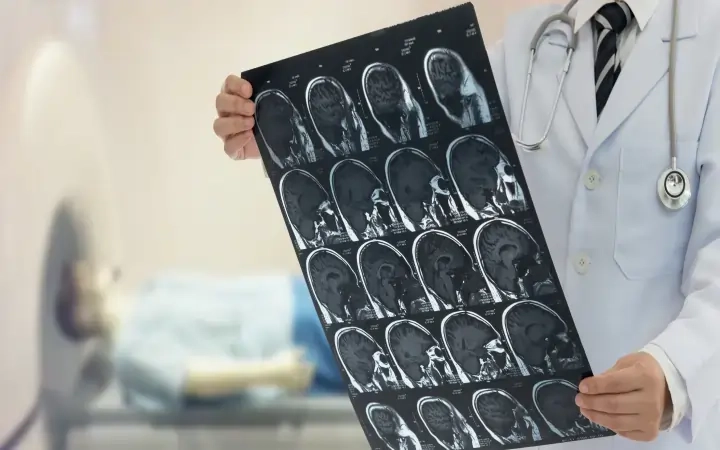Neuro Imaging Services
AMI’s expert neuroimaging team with global experience thrive to improve the patient outcome by swift multimodal diagnostic approach and deep technological expertise. With multiple patents in hand, our credentialed team of radiologists continuously strive to improve the imaging operations and standards of care.
Neuro imaging serves as a decision-making tool in stroke, neurooncology, trauma, and multiple psychiatric conditions. Massive innovation has made it possible to bring advancements in neuroimaging. We now have a plethora of advanced neuroimaging technologies including MRI parallel imaging, fMRI, multi-echo sequences, arterial spin labeling, 3D CSI spectroscopy, myelography, neurography, CT angiography, CT DSA, Doppler ultrasound, which pin downs the pathology with the highest precision. Recent breakthrough research in neuroimaging has shown remarkable changes in the way we treat Dementia.
AMI has an expert team of neuroradiologists with extensive international training and clinical expertise. Multidisciplinary in approach, we provide protocol-based services/ treatment to patients with the help of technicians and other support staff.
AMI, one of the best Neuroimaging service providers, leverages the most advanced neuroimaging modalities for detailed evaluation of both structural anomalies and functional changes.

What do we offer at AMI?
How Neuro Imaging Reporting Can Improve Your Throughput Using Our Services
Quality
Reporting standards followed as per guidelines from the American College of Radiology (ACR) & The Royal College of Radiologists (RCR)
On-Time Reports
Reliable, and accurate reports with less turn-around time. 99% of the emergency reports are delivered in less than 1 hour.
24/7 Compliance
Internationally certified radiologists with Sub-specialty expertise are available 24×7 for 365 days a year.
FAQs
Neuroimaging refers to a set of advanced medical techniques employed to visualize and study the structure and function of the brain. These techniques include magnetic resonance imaging (MRI), computed tomography (CT), positron emission tomography (PET), and others. The primary goal of neuroimaging is to provide detailed and non-invasive images of the brain, allowing healthcare professionals and researchers to examine its anatomy, detect abnormalities, and understand its intricate functions. In a clinical context, neuroimaging plays a pivotal role in diagnosing and monitoring neurological disorders such as strokes, tumors, and degenerative conditions. It offers valuable insights into the location, extent, and nature of brain abnormalities, aiding in treatment planning and providing a basis for personalized patient care. Additionally, neuroimaging is a cornerstone in neuroscience research, enabling scientists to explore brain activity, connectivity, and responses to stimuli. The wealth of information obtained through neuroimaging contributes to a deeper understanding of the brain's complex architecture and functionality, driving advancements in both clinical medicine and scientific knowledge.
Neuroimaging, encompassing techniques such as magnetic resonance imaging (MRI), computed tomography (CT), and positron emission tomography (PET), offers benefits in the realm of neuroscience and clinical medicine. One primary advantage lies in its ability to provide detailed and non-invasive visualization of the structure and function of the brain. Neuroimaging plays a crucial role in diagnosing and understanding various neurological disorders, including tumors, strokes, and degenerative conditions. Early detection and precise localization of abnormalities contribute to more effective treatment planning. Additionally, neuroimaging is invaluable in research, enabling scientists to explore brain function, connectivity, and responses to stimuli. It has become an essential tool in mapping brain activity during cognitive tasks, shedding light on the intricate mechanisms underlying human cognition. The insights gained from neuroimaging not only aid in clinical decision-making but also advance our understanding of the complexities of the brain, fostering breakthroughs in neuroscience and contributing to the development of innovative therapeutic interventions.
Neuroimaging holds paramount importance in the field of medicine and neuroscience, offering unprecedented insights into the structure and function of the brain. Neuroimaging plays a crucial role in the diagnosis and understanding of various neurological disorders. It allows healthcare professionals to visualize and analyze the brain's anatomy, detecting abnormalities such as tumors, vascular issues, or degenerative conditions with remarkable precision. Neuroimaging insights not only help with clinical decision-making, but they also increase our understanding of the intricacies of the brain, stimulating neuroscience breakthroughs and contributing to the creation of novel treatment strategies.

AMI Expertise - When You Need It, Where You Need It.
Partner With Us

